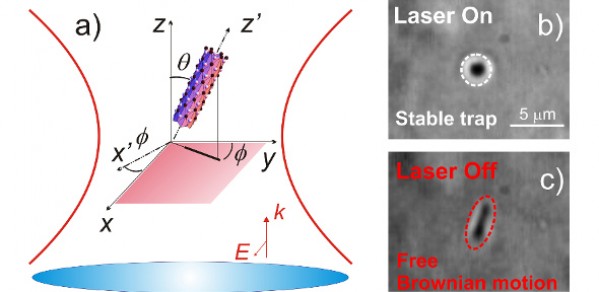
The Newton International Fellowship scheme selects the very best early stage post-doctoral researchers from all over the world, and offers support for two years at UK research institutions. The long-term aim of the scheme is to build a global pool of research leaders and encourage long-term international collaboration with the UK.
Dr. Francesco Bonaccorso
Francesco summarises his research: "my research activities focus on carbon nanotubes. These have enormous potential for applications in nanoelectronics, and nanophotonics, such as ultra-high performance transistors and ultrafast lasers for applications in optical communication, laser processing and medicine. Single wall carbon nanotubes (SWNT) are formed by rolling up single sheets of graphite (graphene). The rolling direction of the SWNT's, also known as the chirality, can be envisaged as right handed and left handed thread screws. This chirality and the diameter determine their electronic properties. To date SWNT consist of bundles containing a number of individual tubes each with different diameters and chirality. Obtaining nanotube samples with specific diameter or chirality makes them much more useful for future applications."
"As a Newton International Fellow in the Nanomaterials and Spectroscopy Group of Dr Andrea Ferrari, I will aim to develop new methodologies to achieve chirality-controlled nanotube solutions and composites. I will also produce solutions and composites of graphene with controlled number of layers. This could lead to the large-scale use of this novel material as anode in displays and solar cells. It will also allow fundamental studies and comparison with nanotube based solutions and composites. In a recent collaboration between my home institution, CNR - Istituto Processi Chimico-Fisici in Messina, Italy, and the University of Cambridge Department of Engineering, we have realised the first photonic force microscope based on nanotubes, allowing an unprecedented force resolution of 8 femtoNewton combined with a spatial resolution of a few nanometers."
Francesco has also won a Research Fellowship at Hughes Hall.
Further information can be found on the Nanomaterials and Spectroscopy Group webpages.
Dr. Robert Gordon
Robert summarises his research: "managing fuel scarcity and mitigating global warming are two of the most pressing challenges of the 21st century. Developing and understanding sources of energy that have a low carbon impact and are not only renewable, but do not compete with food production land uses, is an essential step towards meeting these challenges. Second generation biofuels will play a central role in the low carbon economy as renewable energy sources for land and air-based transport, and manufacturing, and in this regard, engineering combustion science has a crucial role to play in managing the challenges of transitioning to this low carbon economy, through the development of tools to rigorously characterize and understand the performance of such fuels in existing industrial applications, and in designing new technologies to efficiently and cleanly utilize these energy sources."
"It is within this context that Dr. Robert Gordon, from the Institute of Energy and Power Plant Technology at the University of Technology of Darmstadt, Germany, has been awarded a two year Newton International Fellowship to conduct research into the combustion characteristics of second-generation biofuels here at the Engineering Department. Robert has published both numerical and experimental research into autoignition phenomena, and on his recent research into high repetition rate laser diagnostics in transient combustion. The goal of this research, to be conducted in collaboration with Dr. Nondas Mastorakos, is to develop insights into the combustion processes, pollutant formation, fuel behaviour and methods for increasing combustion efficiency for these alternative fuels."
Robert attended the University of Sydney in Australia as an undergraduate, completing degrees in Mechanical Engineering and in Commerce, and was elected Honorary Treasurer of the Student Union. After a few years in the commercial world, including two years at top-tier management consultancy McKinsey & Company, he returned to Sydney University to write his Ph.D, during which time he also undertook a research placement with Professor Stephen Pope at Cornell University, USA. Following his doctorate Robert has been working as a post-graduate researcher at the TU Darmstadt under Professor Andreas Dreizler.

